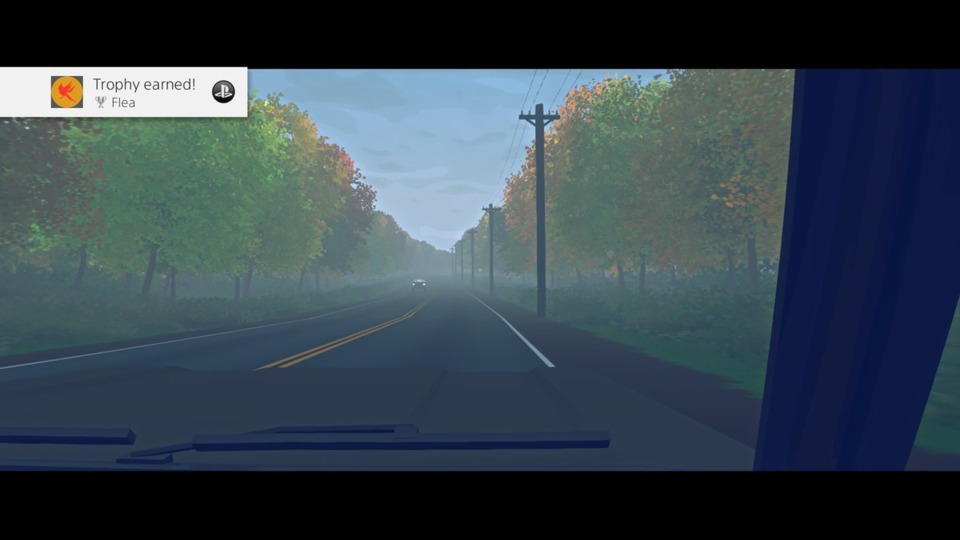
It's tough to know what to make of Virginia, at least sufficiently to offer a critical view in a format like this. That goes for both its narrative and its status as a game alike. Now, I'm not going to throw an adventure game under a bus for opting for a more narrative heavy focus, because I see the genre as ever expanding to include differing levels of interactivity. In fact, I might go so far as to suggest the reason that adventure games are becoming "walking simulators", a pejorative that many designers of these games have kind of reclaimed for themselves, is a response to the greater depth of narrative in almost all other genres of video game. Well, that and the fact that the video game medium is attracting more talent from the spheres of novels and movies who are looking to explore what might be possible in this otherwise underutilized arena for storytelling.
No, the issue for me is that Virginia is a very railroaded story with the barest of interactions - simply clicking on the various plot-specific objects and NPCs placed before you - and unlike many other games of its type, especially those in the detective/crime-solving genre, it doesn't afford a whole lot of exploration and incidental content to peruse. Consider how much of Gone Home involved establishing threads and additional context through documents and items that weren't strictly necessary to the progression of the core narrative. If all you wanted from Gone Home was to solve the mystery behind Katie Greenbriar's family's disappearance, you could simply run from room to room as soon as you had the means to unlock them and solve the mystery within minutes. Virginia's sort of like that, in that you're pushing through the story through a series of short vignette "chapters" that almost jarringly has you teleporting from relevant scene to relevant scene to move the story forward. Even Dear Esther, which had almost zero incidental content to speak of, at least had you cover those distances between story-critical areas on your own.

At the same time, I'll give credit to Virginia for crafting a narrative that is heavy on subtext and symbolism, since it is entirely dialogue-free. As a novice FBI agent given the unenviable assignment to keep tabs on a senior agent, Maria Halperin, while on a routine missing persons case in the small Virginian town of Kingdom, the player sees snippets of a week in Anne Tarver's life: investigating the case, following leads, befriending her partner only for her to discover Anne's ulterior objective, finding out the reason why your partner is under suspicion in the first place, and having to choose between your conscience or your career in the Bureau. It's an artistically-woven tale, accompanied with a fantastic orchestral score by the City of Prague Philharmonic Orchestra, and one that rewards those who pay attention to their surroundings. Personally, I saw what I wanted to see and chose to interpret the game's story in a manner that made sense to what I witnessed, but I'm almost hesitant to check my account against others. It's not quite a Her Story style "keep investigating until you are satisfied with your answer" approach, because the story has a concrete beginning, middle and end: there's no forks in the road you can take, I'm almost certain, and Tarver makes the choices she does without your input. It's interactive fiction in the broadest sense.
All in all, Virginia's hardly what you would call a conventional story told in a conventional way, especially with all the snap cuts between scenes and occasional dreamlike flights of fancy, but at the same time there's very little reason why it wouldn't have worked better as a movie or TV show instead. I'm not trying to diminish its value as a video game; just curious why it didn't utilize any of the many ways the video game format in particular can enhance the telling of a story like this as others of its type have done in recent memory, from letting players explore the world for optional texts to fill out additional details about the plot and its characters, to viewing the same scenes from different angles and revealing new information, to letting the player pick the order of events or choose from branching paths to personalize their own rendition of the events. Virginia didn't need to have any of those, of course; these are simply examples of game-unique concepts this genre has presented in recent years. I'm just not sure Virginia really adds anything to this particular first-person sub-genre of interactive fiction besides another yarn told in an idiosyncratic manner. Maybe we're just at that point where the boundaries have been sufficiently broadened and authors want to explore the current space to tell their stories, instead of trying to push that game design envelope ever further. I know I'm definitely not giving it enough credit here as a story told well and distinctively, but then I always was the type to focus on game design first. I'd probably recommend Virginia overall, largely because of the quality and the distinctiveness of its eccentric presentation, but just keep in mind you don't have a whole lot of agency on what occurs and must do the lion's share of figuring out what actually happens. If any of that appeals, by all means try it for yourselves.
Rating: 4 out of 5.
| < Back to 33: Trine 2 | > Forward to 35: SteamWorld Heist |

Log in to comment